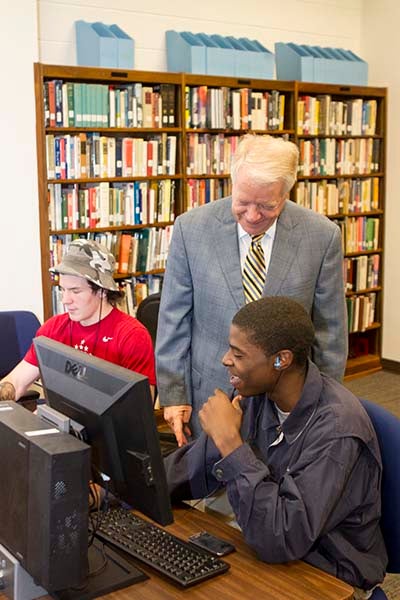Interim PDCCC president ready to start work
Published 8:32 pm Friday, May 1, 2015
FRANKLIN
Dr. William C. Aiken is only a few weeks into his job in Franklin, and he’s still in the meet-and-greet phase. It won’t last long, though, as the interim president of Paul D. Camp Community College has only 15 months to right the ship for his yet-to-be-chosen successor.

Interim Paul D. Camp Community College President Dr. William Aiken looks over the shoulder of Franklin resident Dalvonte White, who was on campus to use the Internet. Caleb Dundlow, a first-year student, works on some homework nearby. Photo by Cain Madden.
His tasks? First, he has to make progress in overturning the declining enrollment and the challenges this has created financially for the college. Right now, Paul D. Camp is looking at a 25 percent reduction in students, which far outweighs the average decline seen around the commonwealth.
Simultaneously, he needs to address the strategic plan for the college, and how it can better serve the community through curriculum, programing and as a fundraising foundation.
Aiken has also got to work on making a largely part-time staff happy, following the widely unpopular leadership style of the man he is replacing, Dr. Paul Wm. Conco. The former president, who started in 2010, was ousted three months before his planned retirement date at the end of June.
Aiken said he didn’t know anything about Conco, has not met him, and he believes that might be a good thing. He only was made aware of the opportunity three weeks before the announcement was made.
“I’m going to try and approach this as open as possible, and I hope it will work to my advantage as we work forward,” Aiken said. “I’ve met with the staff, and we’ve talked about addressing the issues.
“The faculty has been very welcoming to me.”
He’s also got some hard rumors to deal with — the possible closing of the Suffolk campus or the Isle of Wight center and a merger with Tidewater Community College.
“I’ve spoken to the [Virginia Community College System] chancellor, and he told me his intentions are not to close the place down,” Aiken said about the merger. He then added firmly that neither Suffolk nor Isle of Wight would close. “Actually, there is a great opportunity for growth in Suffolk. I hope there will be growth at all three locations.”
While here, Aiken will be renting in Franklin. His permanent home is back in North Carolina, where he was the president of Sampson Community College for 12 years. After retiring in 2012, he served as an interim president at two colleges, Haywood and Rockingham, facing similar challenges to Paul D. Camp.
As part of the strategic plan, Aiken said there’s one thing he can pull from his previous experience, and that’s knowing a college’s strengths and the community at large.
“I’m a little surprised about the lack of focus on agriculture here,” he said, adding that he would work to have a partnership with an institution such as Virginia Tech.
He’d done similar work at Sampson, creating a partnership with North Carolina State University that benefited both schools and gave the community college a shining program to be proud of.
“We would often get students who might have gone to N.C. State because our facilities were better,” he said with a laugh.
Agriculture set them apart from other colleges, and Aiken would like to see Paul D. Camp Community College have a program for which it is known.
“We have not done a good job communicating to the at-large community,” Aiken said. “We have to figure out how to distinguish ourselves from other colleges. I don’t think that has happened here.”
Enrollment has a few challenges, but a few ideas are to further develop the college’s relationship with the local schools, reach the children at a younger age, and to create an enrollment team.
“We need to involve everyone in the enrollment efforts,” Aiken said. “I’m not talking about someone just going to college fairs. We need to build a relationship with the students — give a pitch on how close it is to home and all of the savings.
“If everyone could attract two to three students? We’d double our enrollment numbers over night.”
On a scale of one to 10, Aiken said Paul D. Camp Community College is a 4.5. If he could bring it to a seven in a year and three months, he said he’d have done what he set out to do.
“If I could get it to a seven and know everyone is working toward making it a 10, I’d feel great,” he said.
Taking on an interim job requires someone who is wired differently.
“When I retired, I found that I still liked to work,” Aiken said. “The interim thing is great — I do enjoy it.
“I’d like to think I’ve learned some things over the years that could be useful.”
Thinking about the reality of a 15-month time frame, Aiken said that would be a challenge.
“For my other interim jobs, there has been some overlap,” he said. “If getting the college to where it needs to be means staying for a longer period, I would not up and leave. I would not abandon the place.”




